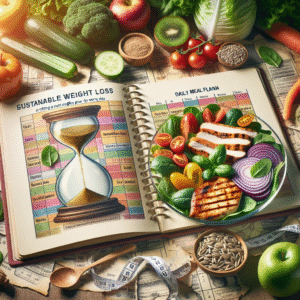Introduction to Sustainable Weight Loss
Sustainable weight loss is not just about shedding pounds; it’s about adopting a healthier lifestyle that you can maintain long-term. This approach focuses on nourishing your body with wholesome foods while allowing you to enjoy your meals. Crafting a meal plan that balances nutrition and satisfaction is key to achieving and sustaining your weight loss goals.
Understanding the Basics of a Healthy Meal Plan
Before diving into meal planning, it’s crucial to understand the components of a healthy diet. Key components include:
- Whole Grains: Opt for brown rice, quinoa, and whole grain bread over refined grains.
- Fruits and Vegetables: Aim for a variety of colors to maximize nutrient intake.
- Lean Proteins: Incorporate chicken, fish, beans, and legumes for muscle maintenance and satiety.
- Healthy Fats: Include sources like avocados, nuts, and olive oil in moderation.
- Hydration: Drink plenty of water and limit sugary beverages.
Crafting a Weekly Meal Plan
A well-structured meal plan can simplify your daily routine and reduce the temptation of unhealthy eating. Here’s an example of a balanced meal plan for the week, including breakfast, lunch, dinner, and snacks.
Day 1
- Breakfast: Overnight oats with chia seeds and mixed berries.
- Lunch: Quinoa salad with chickpeas, cucumber, and feta.
- Dinner: Grilled salmon with steamed broccoli and brown rice.
- Snack: A small handful of almonds.
Day 2
- Breakfast: Greek yogurt with honey and sliced bananas.
- Lunch: Turkey and spinach wrap on whole grain tortilla.
- Dinner: Stir-fried tofu with mixed vegetables.
- Snack: Celery sticks with almond butter.
Day 3
- Breakfast: Smoothie with spinach, banana, and protein powder.
- Lunch: Lentil soup with whole-grain bread.
- Dinner: Baked chicken breast with sweet potatoes and green beans.
- Snack: Cottage cheese with pineapple.
Day 4
- Breakfast: Scrambled eggs with tomatoes and spinach.
- Lunch: Mediterranean quinoa bowl with olives and roasted vegetables.
- Dinner: Zucchini noodles with marinara sauce and turkey meatballs.
- Snack: Sliced apple with cinnamon.
Day 5
- Breakfast: Chia pudding topped with kiwi and coconut.
- Lunch: Black bean salad with corn and avocado.
- Dinner: Shrimp tacos with cabbage slaw.
- Snack: Air-popped popcorn with nutritional yeast.
Day 6
- Breakfast: Whole grain toast with avocado and poached egg.
- Lunch: Spinach salad with grilled chicken, nuts, and vinaigrette.
- Dinner: Vegetable curry with brown rice.
- Snack: A handful of mixed berries.
Day 7
- Breakfast: Smoothie bowl with assorted fruits and seeds.
- Lunch: Hummus and vegetable plate with whole grain pita.
- Dinner: Stuffed bell peppers with brown rice and ground turkey.
- Snack: Dark chocolate square and walnuts.
Tips for Success
1. Meal Prep: Prepare meals in advance to reduce cooking time during the week.
2. Stay Flexible: Adapt your meal plan based on seasonal ingredients or your preferences.
3. Listen to Your Body: Pay attention to hunger cues and don’t skip meals.
4. Stay Active: Combine your meal plan with regular physical activity to enhance weight loss.
Conclusion
Crafting a sustainable meal plan for weight loss revolves around balance, variety, and enjoyment. By focusing on nutrient-dense foods and maintaining flexibility in your diet, you will not only achieve your weight loss goals but also foster long-term health habits. Remember, sustainable weight loss is a journey, not a race.
Frequently Asked Questions
What is sustainable weight loss?
Sustainable weight loss refers to the gradual process of losing weight in a healthy manner, focusing on long-term changes to lifestyle and eating habits rather than quick fixes or extreme diets.
How can I stay motivated on my weight loss journey?
Set realistic goals, track your progress, and celebrate small victories to maintain motivation. Find a community or support group to share experiences and challenges.
Is it okay to indulge occasionally?
Yes! Occasional indulgence can help satisfy cravings and reduce feelings of deprivation. Just be sure to practice moderation and balance it out with healthier choices.
Can I lose weight without exercising?
While diet plays a crucial role in weight loss, combining it with physical activity is beneficial for overall health and can accelerate weight loss. However, some individuals may lose weight solely by adjusting their diet.
How often should I change my meal plan?
It’s beneficial to change your meal plan periodically to prevent monotony and ensure a varied diet, ideally every few weeks. Adjust based on your preferences, goals, and seasonal ingredients.


















